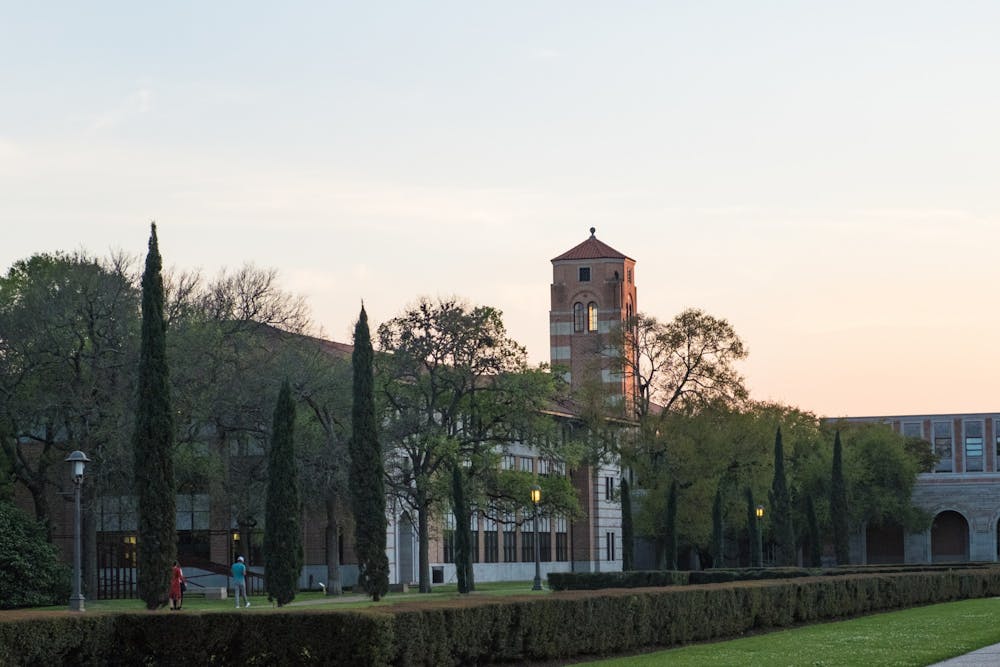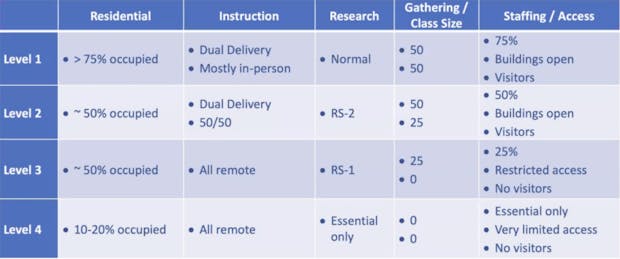Administration shares logistics on plans for remainder of fall semester

The Faculty Senate met yesterday to discuss Rice University’s plans for the remainder of the fall semester and potential responses to COVID-19 case increases. The meeting follows the passing of a recent resolution expressing faculty disappointment with the Rice administration, due to implicit pressure on faculty to return in-person to campus.
According to Speaker of the Faculty Senate Christopher Johns-Krull, in response to the resolution, the administration affirmed their willingness to regularly update and consult with the faculty senate over the university’s plans moving forward regarding COVID-19.
Vice President for Administration Kevin Kirby spoke at the faculty senate meeting to share the logistics of the university’s plan for this semester.
According to Kirby, rather than discrete trigger point case numbers for shutting down campus operations, the Crisis Management Advisory Committee is approaching COVID-19 cases in terms of a continuum.
“We try to think of it as a continuum of potential states, and we use data and analysis of the kinds of things that would indicate a need to change to a different operational state,” Kirby said.
Rice is monitoring certain metrics to determine if a change in operation level is necessary, which includes the daily data provided by the Texas Medical Center, according to Kirby.
These metrics also include testing capacity, isolation building capacity, and monitoring if Student Health Services becomes overwhelmed by student volume. The care capability of the TMC is also a factor, as well as any government orders that Rice is required to follow, said Kirby.
Kirby said Rice is currently around level two in the continuum of operational states. Rice was at level four during March when the campus-wide shutdown was put into effect.

The Crisis Management Advisory Committee is chaired by Kirby and is composed of 10 senior Rice officials, including the president, provost and dean of undergraduates, among others. According to Kirby, the Crisis Management Advisory Committee is the primary decision-making organization for COVID-19 changes, and works with the Rice Crisis Management team, which is a 60-person organization split into various sections.
Kirby said that the Crisis Management Advisory Committee and Crisis Management team are utilizing a wide variety of tools to monitor the state of campus, including population density tools as well as the ability to increase physical interventions such as restricting access to buildings or increasing cleaning of shared facilities.
“We’re going to roll out an app soon for students to monitor their daily health symptoms,” Kirby said. “We've also built a Google Analytics platform to correlate infection rates by certain residential areas on campus or classes or things like that, so we can act decisively and quickly if we need to make some kind of an intervention.”
Kirby also mentioned how COVID-19 testing at Rice has been operating thus far.
“We use three different vendors to avoid supply chain disruption issues and we're developing a fourth vendor to utilize,” Kirby said. “Generally we're getting test results within 8 hours, or in many cases under 24 hours, which is particularly important for contact tracing purposes. If you aren't getting test results for four to seven days it's like you're not getting tested at all, because you can't contact trace then.”
Rice President David Leebron also spoke at the meeting to discuss the state of finances of the university.
“The good news is that we estimate the endowment to be down only 1 percent - this is one of those years where you congratulate the endowment managers for only being down 1 percent,” Leebron said. “More challenging is that this represents an 8.5 percent difference on what we would ordinarily expect on endowment returns, so that has the potential to be a long term problem but that will all depend on future returns.”
Leebron said COVID-19 testing and the facilities that have been constructed this semester have been the bulk of the expenses, and there was significantly less revenue generated by housing expenses because the campus is operating at about 50 percent capacity.
Leebron also briefly mentioned his thoughts on the international student community at Rice.
“One issue we are watching and remain concerned about is the impact on our international students,” Leebron said. “This includes whether we will be able to have as robust of an international student community in future years, given the restrictions going on, but we are enthusiastic about that community and will do anything we can to make it possible for that community to return to Rice.”
More from The Rice Thresher

Over 1,000 students petition against new meal plan
When Konstantin Savvon opened the Housing and Dining email announcing the new unlimited meal plan, he was instantly concerned about the impact on off-campus students like himself.

Rice football wins season opener under new coach
For the first time since 2018, Rice football opened its season with a victory. Scott Abell was soaked with yellow Powerade following a 14-12 win on the road Saturday against the University of Louisiana at Lafayette, which won 10 games and made it to the Sun Belt Conference championship last season.

Acting like an athlete: Rice basketball alum takes on Broadway
Underneath Chadd Alexander’s Broadway costume, there’s ankle tape and wrist braces — same protective gear he wore as a walk-on basketball player at Rice, though now he’s performing eight shows a week in the ensemble of “Harry Potter and the Cursed Child” instead of running conditioning drills in Tudor Fieldhouse.

Please note All comments are eligible for publication by The Rice Thresher.